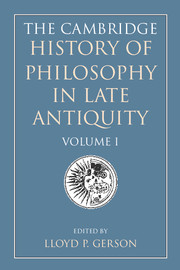Book contents
- Frontmatter
- General introduction
- I Philosophy in the later Roman Empire
- II The first encounter of Judaism and Christianity with ancient Greek philosophy
- III Plotinus and the new Platonism
- Introduction to Part III
- 17 Plotinus
- 18 Porphyry and his school
- 19 Iamblichus of Chalcis and his school
- IV Philosophy in the age of Constantine
- V The second encounter of Christianity with ancient Greek philosophy
- Map 1 The Byzantine Empire, c. 500
Introduction to Part III
from III - Plotinus and the new Platonism
Published online by Cambridge University Press: 28 May 2011
- Frontmatter
- General introduction
- I Philosophy in the later Roman Empire
- II The first encounter of Judaism and Christianity with ancient Greek philosophy
- III Plotinus and the new Platonism
- Introduction to Part III
- 17 Plotinus
- 18 Porphyry and his school
- 19 Iamblichus of Chalcis and his school
- IV Philosophy in the age of Constantine
- V The second encounter of Christianity with ancient Greek philosophy
- Map 1 The Byzantine Empire, c. 500
Summary
Plotinus is generally acknowledged to be, after Plato and Aristotle, the dominant figure in the entire history of ancient Greek philosophy. Beginning in the eighteenth century, German historians of philosophy gave Plotinus and his successors the pejorative label ‘Neoplatonists’. With this label ‘Neo’ they explicitly intended to indicate a decline in the rational purity of Platonic thought. Plotinus, however, in no way regarded himself as an innovator. He consistently maintained that he was explicating and defending the philosophical view that we know as ‘Platonism’ and that he believed was found primarily, though not exclusively, in the dialogues of Plato. Typical of all Plato’s disciples, Plotinus welcomed insight into the nature of Platonism from the testimony of Plato’s immediate disciples – especially Aristotle – and from what we can only suppose was the continuous oral tradition beginning within the Old Academy and leading up to Plotinus himself. At least part of the appearance of innovation arises from Plotinus identifying as authentically part of Platonism what he took to be necessary implications of claims made explicitly in the dialogues. In addition, Plotinus as well as his successors, taking Aristotle to be an Academic – albeit at times a dissident one – were content to articulate Platonic claims in Aristotelian language. We shall find throughout this book that Aristotelian terminology and arguments are regularly used by self-declared disciples of Plato to express the Platonic world view.
- Type
- Chapter
- Information
- The Cambridge History of Philosophy in Late Antiquity , pp. 299 - 300Publisher: Cambridge University PressPrint publication year: 2000

